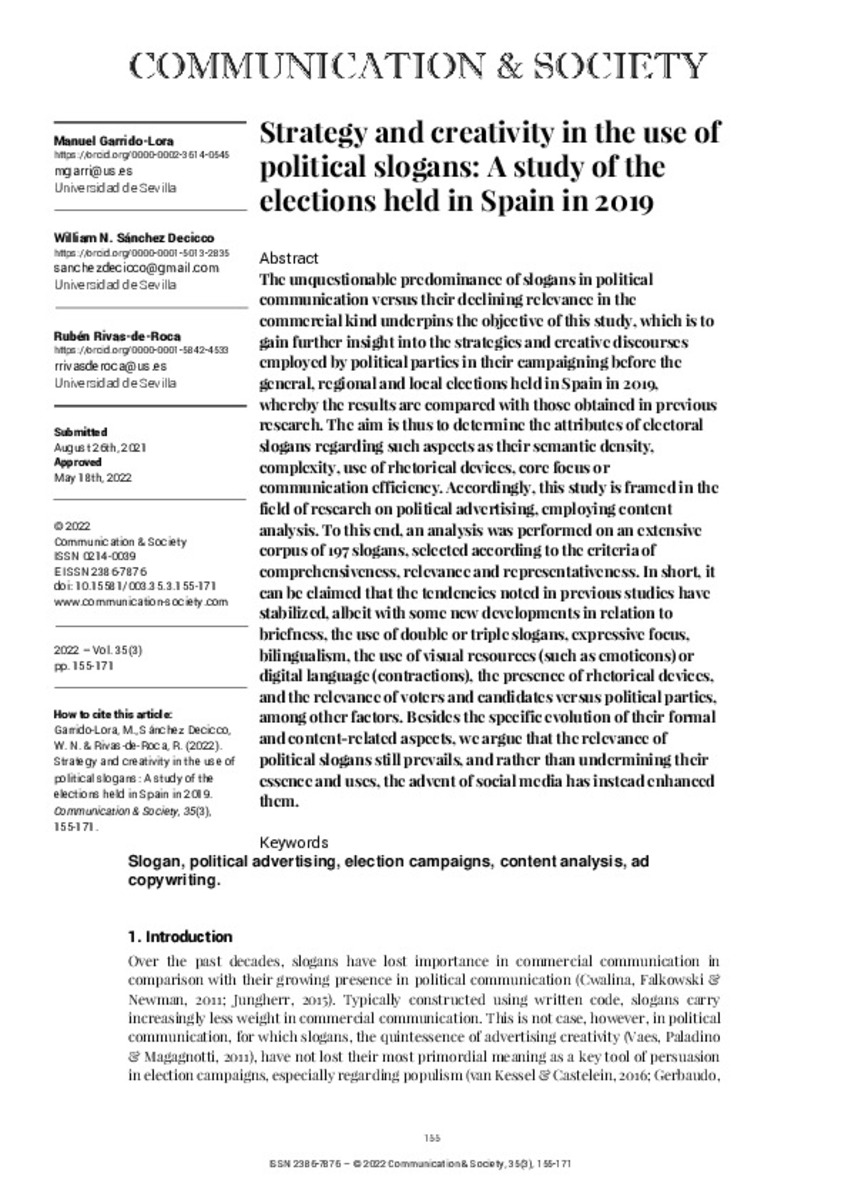Full metadata record
| DC Field | Value | Language |
|---|---|---|
| dc.creator | Garrido-Lora, M. (Manuel) | - |
| dc.creator | Sánchez-Decicco, W.N. (William N.) | - |
| dc.creator | Rivas-de-Roca, R. (Rubén) | - |
| dc.date.accessioned | 2022-06-07 | - |
| dc.date.accessioned | 2022-08-16T08:58:56Z | - |
| dc.date.available | 2022-08-16T08:58:56Z | - |
| dc.date.issued | 2022 | - |
| dc.identifier.citation | Garrido-Lora, M. (Manuel); Sánchez-Decicco, W.N. (William N.); Rivas-de-Roca, R. (Rubén). "Strategy and creativity in the use of political slogans: A study of the elections held in Spain in 2019". Communication & Society. 35 (3), 2022, 155 - 171 | es |
| dc.identifier.issn | 2386-7876 | - |
| dc.identifier.uri | https://hdl.handle.net/10171/63931 | - |
| dc.description.abstract | The unquestionable predominance of slogans in political communication versus their declining relevance in the commercial kind underpins the objective of this study, which is to gain further insight into the strategies and creative discourses employed by political parties in their campaigning before the general, regional and local elections held in Spain in 2019, whereby the results are compared with those obtained in previous research. The aim is thus to determine the attributes of electoral slogans regarding such aspects as their semantic density, complexity, use of rhetorical devices, core focus or communication efficiency. Accordingly, this study is framed in the field of research on political advertising, employing content analysis. To this end, an analysis was performed on an extensive corpus of 197 slogans, selected according to the criteria of comprehensiveness, relevance and representativeness. In short, it can be claimed that the tendencies noted in previous studies have stabilized, albeit with some new developments in relation to briefness, the use of double or triple slogans, expressive focus, bilingualism, the use of visual resources (such as emoticons) or digital language (contractions), the presence of rhetorical devices, and the relevance of voters and candidates versus political parties, among other factors. Besides the specific evolution of their formal and content-related aspects, we argue that the relevance of political slogans still prevails, and rather than undermining their essence and uses, the advent of social media has instead enhanced them. | en_US |
| dc.language.iso | eng | - |
| dc.publisher | Servicio de Publicaciones de la Universidad de Navarra | es_ES |
| dc.rights | info:eu-repo/semantics/openAccess | es_ES |
| dc.title | Strategy and creativity in the use of political slogans: A study of the elections held in Spain in 2019 | en_US |
| dc.type | info:eu-repo/semantics/article | es_ES |
| dc.identifier.doi | 10.15581/003.35.3.155-171 | - |
| dadun.citation.endingPage | 171 | - |
| dadun.citation.number | 3 | - |
| dadun.citation.publicationName | Communication & Society | - |
| dadun.citation.startingPage | 155 | - |
| dadun.citation.volume | 35 | - |
Files in This Item:
Statistics and impact
Items in Dadun are protected by copyright, with all rights reserved, unless otherwise indicated.






